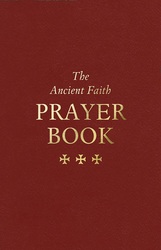Why is it so hard to pray?
I had decided that each evening during Lent I would spend 15 minutes in church saying the Jesus Prayer. Instead there I stood outside the church door reorganizing the bulletin board which didn’t need it, or walking over to my office to straighten up my desk which didn’t need it – well, no more than usual. Or I’d check how the climbing vine in the narthex was doing. Anything but go into church and pray. Then I would hurry in at the last minute and vest for the evening service. Why was I not praying?
I knew how often Jesus withdrew for prayer. If he needed it, did I think I didn’t? I knew how prayer kept me united with God, “plugged in” so that my spiritual batteries  wouldn’t run down. I knew prayer gives us strength and perspective to cope with life, makes things go more smoothly. Did I think I didn’t have time? I had taught that “prayer doesn’t take time, prayer makes time” – keeps us more focused on what’s important, less inclined to waste time on trivia. And there I had just spent 15 minutes of prayer time doing nothing. Why was I not praying?
wouldn’t run down. I knew prayer gives us strength and perspective to cope with life, makes things go more smoothly. Did I think I didn’t have time? I had taught that “prayer doesn’t take time, prayer makes time” – keeps us more focused on what’s important, less inclined to waste time on trivia. And there I had just spent 15 minutes of prayer time doing nothing. Why was I not praying?
Finally I realized what was going on: Someone was trying to keep me from praying. This is Satan’s most devious, pernicious work. I discovered what to say when he came at me: “Satan, go to hell.” After that I usually made it into church. Not always. It’s a never-ending struggle, and sometimes I lost.
What follows here are some other things I’ve learned over the years about the prayer life. You can find this advice in any good book about prayer, so if you already know it and practice it, feel free to tune out now.
Have I always taken my good advice? No. I’ve got better in old age, probably out of fear. I worry I’ll drop dead and arrive at the gates of Heaven and hear, “What?! You didn’t even say your prayers yesterday?”
The Divine Liturgy
If you want to keep your daily prayers on track, start somewhere else – with the Liturgy. This is the center of Orthodox worship and prayer, its pattern and its inspiration, which then flows out into the week. If for good cause (and it had better be really good, like your car breaks down or something) you cannot get to Sunday Liturgy, come to Saturday evening Vespers, or weekday services if your church offers them. Here at Saint Nicholas we have regular Monday and Wednesday Orthros/Matins, plus saints’ days and Lenten services. Let your personal prayer life be shaped and guided by the Church’s pubic prayers.
Set up a Plan for your Daily Prayers
Western Christians often call this a “Rule of Prayer”. We Orthodox need one, too. I suspect too many of us pray only when the “spirit” moves us. That’s a good way for our daily prayer life to just sort of dribble away. We need regular disciplined prayer. Here are some basic elements to help you set up your plan.
When to Pray
Set fixed times for prayer, from which you vary only if you must. Otherwise you’ll probably not get around to it.
Morning and evening (early or before you go to bed) are the best times. Christians and Jews before us have always felt the  need to consecrate sunrise and sunset – which is why our chief daily services are Vespers for sunset and Matins/Orthros for dawn – in that order, because of Genesis 1: “There was evening and morning, the first day”.
need to consecrate sunrise and sunset – which is why our chief daily services are Vespers for sunset and Matins/Orthros for dawn – in that order, because of Genesis 1: “There was evening and morning, the first day”.
I am a morning person so, when we don’t have morning services at church, I do my major praying right after I get out of bed – well, first I get a cup of coffee so my brain will function. If I don’t pray immediately, I often get distracted and don’t get back to it.
I trust we all give thanks at meals. If you can do more prayers with your family, that’s good. But don’t pressure them into it or make them feel uncomfortable. That’s not good praying. I must tell you this story: A young mother from Saint Nicholas was doing morning prayers with her pre-school children, and her sister-in-law overheard “Holy God, holy Mighty, holy Immortal, have mercy on us. Holy God, holy Mighty, Luke, stop hitting your sister! holy Immortal, have mercy on us…”
Pray anytime you can. “Walk with God”, like Enoch. Genesis 5:22,24
Where and How to Pray
Anywhere! If you have a few minutes at work pray there – but do not make a show of it. Christ tells us when we pray to “go into your closet”, so we “won’t be seen by men”. Matthew 6:5-6 When you can, pray the Jesus Prayer. Before you drive, say a quick prayer for safety and make the sign of the cross. Pray as you drive if it doesn’t take your mind off the road! In the old days before churches were locked during the day, it was great to drop in there to pray. Sadly, no more. At home is the best place. The proper Orthodox home has an icon corner where we ![]() can focus our praying. Some use candles and incense there.
can focus our praying. Some use candles and incense there.
The books all say the best posture for prayer is standing, to honor God. (This also has the advantage that if we go to sleep while praying we fall over!) However, in my old age I can now concentrate better while sitting, and I found I was letting the “perfect” get in the way of the “good”. So in the morning I now sit in my chair facing our icons. Or sometimes I sit across the room facing a painting of railroad tracks disappearing into the morning mist, And I think of the angels coming before too long in an old steam train (I’m a railroad fan) and taking me off through the mists into the Kingdom. (This is crazy theology. I don’t mean it literally. But it helps  somehow – and who knows?)
somehow – and who knows?)
At night I pray from my chair and/or in bed. Nor is this ideal, but I trust God understands. If we drift off while praying, what better way to fall asleep at night?
Regarding “technique”: Some Orthodox use a prayer rope to say the Jesus Prayer, wearing it on their wrist to keep it handy. This may be right for you; I don’t find it helpful for myself. The Jesus Prayer is the typical Orthodox way of meditating: “Lord Jesus Christ, Son of God, have mercy on me, a sinner”, repeated slowly over and over. Some coordinate it with their breathing: “Lord Jesus Christ, Son of God” in, “have mercy on me, a sinner” out. I have found this difficult, too, I think because my mind wanders easily. I wish it didn’t. But try it. It may be just right for you.
However, for 35 years swimming at the Y, I have given the first 6 laps to “Holy God…”, the second set to the Jesus Prayer, and so on. (Penitent: “Father, may I eat while I’m praying?” Priest: “No, my son, but you may pray while you’re eating.”) Unusual, but it works for me, and it’s a half hour spent with God. Once someone asked about my prayer life, and I blurted out “It’s like I’m floating”, then wondered why I said that. Finally I realized…!
So experiment and find how you pray best.
How Much to Pray
If you have not been praying regularly start small, or you will soon be tempted to give up. Then add more prayers and prayer time as seems natural.
Adjust your praying time to your situation. Take 2 extremes: If you are retired like me, you should pray a lot. On the other hand, if you are a young mother whose infant is  teething day and night, it’s sufficient to occasionally say, “Help, Lord” – or perhaps the “Jesus Prayer” while nursing? Offer a quick prayer to the Theotokos. She will understand. You think the infant Jesus didn’t teethe?
teething day and night, it’s sufficient to occasionally say, “Help, Lord” – or perhaps the “Jesus Prayer” while nursing? Offer a quick prayer to the Theotokos. She will understand. You think the infant Jesus didn’t teethe?
Here is excellent advice from Saint Theophan the Recluse: “Do not concern yourself with the number of prayers read, but only lift your heart and mind to the Lord in prayer, and continue in a worthy manner for the time set aside. A few prayers, correctly read, are better than many prayers read through…”- from The Ancient Faith Prayer Book.
What to Pray
Unlike the daily Offices in Western Christianity which are fixed and fairly simple, Orthodox Matins and Vespers are too complicated for personal use – unless you want to buy over 15 books! Orthodox prayer books provide a simple basic, though very flexible, pattern for daily prayers, and some contain the less complicated Lesser Hours of the day.
Fixed prayer forms teach us how to pray. For example, we learn that we should usually begin praying not with “me”, but with praising and thanking God. (“Our Father who art in heaven, hallowed be thy name…”) Some people use a few fixed prayers, then spend the rest of the time using their own words, or with the Jesus Prayer, or even just keeping silence before God. Others (and I mean me) quickly find our minds wandering during meditative prayer, and we need more fixed forms to keep us on the divine Subject.
Certainly we should offer intercessory prayers for those we love, living and departed, and any who have requested our prayers. I write down the names, so I don’t omit anyone or waste time trying to remember who I just forgot. What should you ask for them? If they have particular needs, be specific – all in the context of “thy will be done”. But usually I pray simply “Lord have mercy on [N.]”. God knows their needs better than I do.
Here again, work out your own system. In my case, over the years certain saints have reached out to me (like 20 of them so far!), so each night I ask each of them “Holy [N.] pray for me [or us]”. I badger Saint Nicholas for parish needs, Saint Nektarios for myself or my family, and Saint Phanourios when I’ve lost something.
If your prayer format ever becomes routine and you’re mostly just rattling off words, vary your system or change prayer books. As with anyone we love, what’s most important is not so much what we say or don’t say, but simply that we regularly spend time with that person – or Person.
Resources for Prayer
There are many fine Orthodox prayer books. Check them out at Amazon or Saint Vladimir’s Press or Light and Life Publications.
1 An old favorite of mine is A Manual of Eastern Orthodox Prayers. It is presently out of print and often costs a small fortune, but if you can find one at a reasonable price it’s an excellent choice. I hope it will reappear. It has beautiful traditional English translations of morning and evening prayers, a daily saints calendar, prayers for seasons and saints’ day, and much more.
2 My Antiochian Archdiocese has a little red Pocket Prayer Book. It could use a bit of resetting and updating, but it’s an excellent resource in many ways, and has the advantage of fitting easily into a shirt pocket.
3 My current favorite is The Ancient Faith Prayer Book. (This is not a paid commercial!) It’s in good modern English with short forms of the traditional morning, noon, evening and night Hours, with  their appointed psalms which I love. It has a superb collection of prayers for all occasions. Saint Patrick’s Breastplate (“I arise today through a mighty strength, the invocation of the Trinity…”) gives this old man strength to begin the day.
their appointed psalms which I love. It has a superb collection of prayers for all occasions. Saint Patrick’s Breastplate (“I arise today through a mighty strength, the invocation of the Trinity…”) gives this old man strength to begin the day.
In the AFPB I first discovered the “Prayer of Saint Aidan of Lindisfarne”. It reflects his life: called from his monastery on the tidal island of Lindisfarne to a mission to northern England, but he longed for his island. His words are appropriate also as we end our morning prayers and go out into the world. In another way it seems right for those of us nearing the time  when “the waters…will take us back” to God.
when “the waters…will take us back” to God.
“Leave me alone with God as much as may be. As the tide draws the waters close in upon the shore, make me an island set apart for You. Then with the turning of the tide prepare me to carry Your presence to the busy world beyond, the world that rushes in on me, till the waters come again and take me back to you.” Above are the ruins of Saint Aidan’s Priory on Lindisfarne.
You will find some favorite prayers too.
The Bible and the Saints
Please try to take a few minutes and supplement your prayers with Scripture reading and the saints of the day. I think the most accessible site is: https://www.goarch.org/chapel/ We’ll talk about how to approach the Scriptures at a later time.
What should we expect to get out of prayer?
Nothing! Almost certainly you will get something out of it, as I said at the beginning. But God is an End in himself. The purpose of prayer is to be with him. Never come to God (or anybody for the matter) with the attitude, “What are you going to give me?” If you really feel prayer is doing nothing for you, keep praying. C.S.Lewis wrote that all our prayer here is practice, sort of like learning multiplication tables in school, so that when we graduate and move out into the Big Wide World, we’ll know how to do it.
And never forget: Satan does not want you to pray. So keep praying.
Next Week: Saint Nektarios the Wonderworker
Week after Next: Scandals in the Church
Thank you for such a nice pastoral article. I have such a hard time keeping my prayer life on track 🙁
Thank you for this article. I have two questions which I hope you will answer:
1 does every prayer needs to have thanksgiving included? Because Philippians 4:6 that says ‘with thanksgiving’
2 Can I pray to God the Father asking to have mercy on someone (you wrote that you pray ‘Lord have mercy on N’ but I assume with Lord you mean the Lord Jesus)?
Thank you
You’re welcome. I think every prayer should be offered in the “spirit” of thanksgiving, but if you look at more than a few Orthodox prayers they don’t say it explicitly. “Lord” here refers to God in general. If you look at the Great Doxology, for example, all three Persons of the Holy Trinity are addressed as Lord. As Father Thomas Hopko used to say, “When you call on One, you get all Three”!
Thank you for the reply, this makes it clearer
Thank you for this helpful essay on prayer, Father.
May I also suggest a new resource from Ancient Faith, When You Pray by Joseph Letendre?
https://store.ancientfaith.com/when-you-pray/
Thank you for this! I think I will return to your advice often. I noticed that you say that the best posture for prayer is standing – what is your view on kneeling to pray? Thanks and God bless you.
Yes, the best posture for prayer is standing. However, whatever works for you is just fine. The important thing is that you pray!
Does it matter for God what position we pray in? I like to pray sitting (I learned to pray like that) but if I look at what is said by the Church Fathers and even contemporary writers I got the impression that I can only sit if I am not able (because of age or infirmities etc.). In other words, my prayer is less acceptable to God if I sit instead of standing whenever I am able to do it. Is my understanding not correct?
Dear Johan: Yes, most Orthodox writers say it is best to stand for prayer, since we are entering into the presence of the Lord. For myself, since I have painful neuropathy, I find that standing (unless I must at Liturgy) interferes with my concentration, so I usually pray sitting or even lying down when I awake or just before I go to sleep. If we say Noon prayers at the office, for example, I think we should not stand, lest we call attention to ourselves. I’m sure God hears our prayers, no matter our posture, so long as the prayer is offered sincerely. If you can concentrate best sitting down, go with that. That’s my opinion, at least.
Thank you Father, it really helps
Father Bill:
I am new to Orthodoxy, and am close to catechumen status.
A sincere question: You quote Matt 6:5-6 in your post. But what is the difference in “15 minutes of the Jesus prayer” and the prayers Christ warns us of in Matt 6:7-8? Can you clarify?
I myself now find myself using the Jesus Prayer, often and as needed, but never for continuous minutes.
thank you.
shannon
Good question, Shannon. So readers don’t have to dig for it, here is Matthew 6:7-8: “And when you pray, do not use vain repetitions as the heathen do. For they think that they will be heard for their many words. Therefore do not be like them. For your Father knows the things you have need of before you ask Him.” Christ here forbids “vain” repetitions, that is just mouthing prayers as if the words by themselves will accomplished some magic effect. Just as we all sometimes rattle off the Lord’s Prayer without even thinking about the meaning. But “sincere” repetitions, seeking to unite ourselves with the Lord, are not forbidden. Verse 8, taken literally and out of context, would forbid prayer for anyone or anything, even ourselves! and he couldn’t have meant that, since elsewhere (as in the Lord’s Prayer) he commands “give us this day our daily bread”.